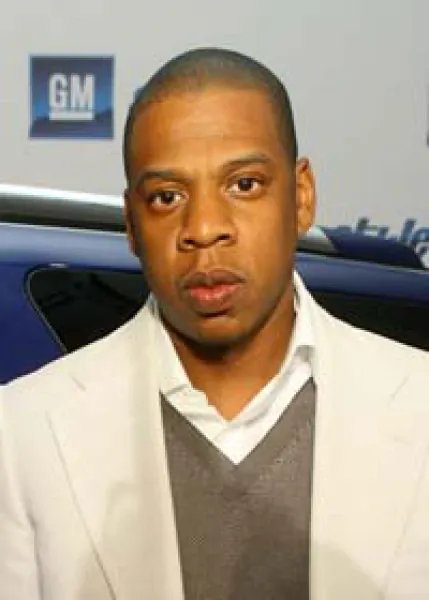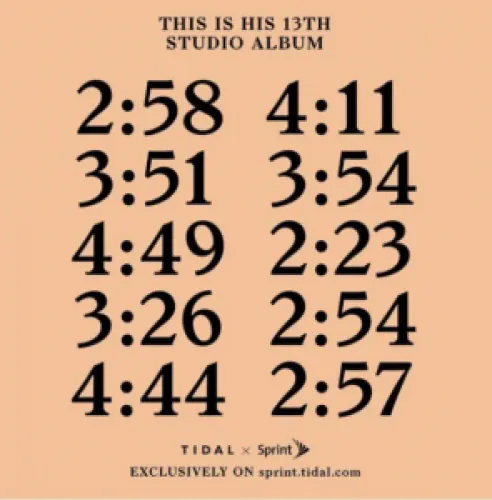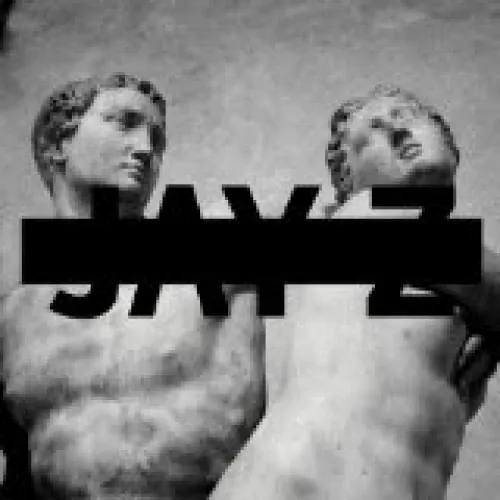
Jay-z
Top Jay-z albums
Top Jay-z lyrics
Jay-z biography
To the admiration of a generation, Jay-Z led an incredibly storied career in the rap industry, pulling himself up by his bootstraps as a youth to one day become the reigning rapper of New York City and then a major-label executive following his retirement from music-making. More than anyone, Jay-Z embodied the ultimate rags-to-riches rap dream, advancing from poverty to power, largely on behalf of his lyrical talent coupled with incredible dedication (while his industry smarts later propelled him to presidential status). Following the Brooklyn-born rapper-turned-president's 1996 debut, Reasonable Doubt, his albums sold millions, and his endless parade of hits made him omnipresent on urban radio and video television. He retained a strongly devoted fan base -- not only the suburban MTV market but also the more fickle urban one as well -- and challenged whatever rivals attempted to oust him from atop the rap game, most notably Nas. As a result of his unchecked power, Jay-Z and his a**ociates greatly influenced the industry and established many of the trends that pervaded during the late '90s and early 2000s. He worked with only the hottest producers of the moment (Clark Kent, DJ Premier, Teddy Riley, Trackmasters, Erick Sermon, Timbaland, Swizz Beatz) and if they weren't hot at the time, they surely would be afterward (Neptunes, Kanye West, Just Blaze). He similarly collaborated with the hottest rappers in the industry, everyone from East Coast rappers like the Notorious B.I.G. ("Brooklyn's Finest") and DMX ("Cash, Money, Hoes"), to the best rappers from the Dirty South (Ludacris, Missy Elliott) and the West Coast (Snoop Dogg, Too Short). Following his self-stated retirement from rapping, he a**umed the presidency of the seminal rap label Def Jam and embarked on another phase in his illustrious career, that of an industry executive.br /br /Born and raised in the rough Marcy Projects of Brooklyn, NY, Jay-Z underwent some tough times after his father left his mother before the young rapper was even a teen. Without a man in the house, he became a self-supportive youth, turning to the streets, where he soon made a name for himself as a fledging rapper. Known as "Jazzy" in his neighborhood, he soon shortened his nickname to Jay-Z and did all he could to break into the rap game. Of course, as he vividly discusses in his lyrics, Jay-Z also became a street hustler at this time, doing what needed to be done to make money. For a while, he ran around with Jaz-O, aka Big Jaz, a small-time New York rapper with a record deal but few sales. From Jaz he learned how to navigate through the rap industry and what moves to make. He also participated in a forgotten group called Original Flavor for a short time. Jay-Z subsequently decided to make an untraditional decision and start his own label rather than sign with an established label like Jaz had done. Together with friends Damon Dash and Kareem "Biggs" Burke, he created Roc-a-Fella Records, a risky strategy for cutting out the middleman and making money for himself. Of course, he needed a quality distributor, and when he scored a deal with Priority Records (and then later Def Jam), Jay-Z finally had everything in place, including a debut album, Reasonable Doubt (1996).br /br /Though Reasonable Doubt only reached number 23 on Billboard's album chart, Jay-Z's debut eventually became recognized as an undisputed cla**ic among fans, many of whom consider it his crowning achievement. Led by the hit single "Ain't No n***a," a duet featuring Foxy Brown, Reasonable Doubt slowly spread through New York; some listeners were drawn in because of big names like DJ Premier and the Notorious B.I.G., others by the gangsta motifs very much in style at the time. By the end of its steady run, Reasonable Doubt generated three more charting singles -- "Can't Knock the Hustle," which featured Mary J. Blige on the hook; "Dead Presidents"; and "Feelin' It" -- and set the stage for Jay-Z's follow-up, In My Lifetime, Vol. 1 (1997).br /br /Much more commercially successful than its predecessor, In My Lifetime peaked at number three on the Billboard album chart, quite a substantial improvement commercially over Reasonable Doubt. The album boasted numerous marketable contributors such as Puff Daddy and Teddy Riley, which no doubt helped sales, yet Jay-Z's decision to move in a more accessible direction for much of the album, trading gangsta rap for pop-rap, increased his audience twofold. Singles such as "Sunshine" and "The City Is Mine" confirmed this move toward pop-rap, both songs featuring radio-ready pop hooks and less of the grim introspection that had characterized Reasonable Doubt. In My Lifetime still had some dramatic moments, such as "Streets Is Watching" and "Rap Game/Crack Game," yet these moments were few and greatly eclipsed by the pop-rap.br /br /Jay-Z's next album, Vol. 2: Hard Knock Life (1998), released a year after In My Lifetime, furthered the shift from gangsta rap to pop-rap. Though Jay-Z himself showed few signs of lightening up, particularly on brash songs like "Cash, Money, Hoes," his producers crafted infectious hooks and trend-setting beats. Songs like "Can I Get A..." and "Hard Knock Life (Ghetto Anthem)" sounded both distinct and unforgettable, garnering enormous amounts of airplay. Again, as he had done on In My Lifetime, Jay-Z exchanged the autobiographical slant of his debut for a sampler platter of radio-ready singles; and again, he reached more listeners than ever, topping the album chart and generating a remarkable six singles: the three aforementioned songs as well as "Jigga What?," "It's Alright," and "Money Ain't a Thang."br /br /Like clockwork, Jay-Z returned a year later with another album, Vol. 3: Life and Times of S. Carter (1999), which sold a staggering number of units and generated multiple singles. Here Jay-Z collaborated with yet more big names (nearly one guest vocalist/rapper on every song, not to mention the roll call of in-demand producers) and his most overblown work yet resulted. Jay-Z scaled back a bit for Dynasty Roc la Familia (2000), his fifth album in as many years. The album showcased mostly Roc-a-Fella's in-house rappers: Beanie Sigel, Memphis Bleek, and Amil. Jay-Z also began working with several new producers: the Neptunes, Kanye West, and Just Blaze. The Neptunes-produced "I Just Wanna Love U (Give It 2 Me)" became a particularly huge hit single this go-round.br /br /Jay-Z's next album, The Blueprint (2001), solidified his position atop the New York rap scene upon its release in September. Prior to the album's release, the rapper had caused a stir in New York following his headlining performance at Hot 97's Summer Jam 2001, where he debuted the song "Takeover." The song features a harsh verse ridiculing Prodigy of Mobb Deep, and Jay-Z accentuated his verbal a**ault (including the lines "You's a ballerina/I seen ya") by showcasing gigantic photos of an adolescent Prodigy in a dance outfit. The version of "Takeover" that later appeared on The Blueprint also included a verse dissing Nas as well as Prodigy. As expected, the song ignited a sparring match with Nas, who responded with "Ether." Jay-Z accordingly returned with a comeback, "Super Ugly," where he rapped over the beats to Nas' "Get Ur Self A" on the first verse and Dr. Dre's "Bad Intentions" on the second. The back-and-forth bout created ma**ive publicity for both Jay-Z and Nas. In addition to "Takeover," The Blueprint also featured "Izzo (H.O.V.A.)," one of the year's biggest hit songs, and the album topped many year-end best-of charts. br /br /Jay-Z capitalized on the album's runaway success with a number of follow-up projects. For instance, he collaborated with the Roots for the Unplugged album (2001) and with R. Kelly for Best of Both Worlds (2002). He then went on to record, over the course of the year, 40 or so new tracks, 25 of which appeared on his next record, the double album The Blueprint: The Gift & the Curse (2002). Though billed as a sequel, The Blueprint was remarkably different from its predecessor. Where the first volume had been personal, considered, and focused, the second instead offered an unapologetically sprawling double-disc extravaganza showcasing remarkable scope. As usual, it spawned a stream of singles, led by his 2Pac cover "'03 Bonnie & Clyde" (featuring his glamorous girlfriend, Beyonce Knowles from Destiny's Child). Furthermore, he guested on Beyonce's summer 2003 cla**ic "Crazy in Love," as well as the Neptunes' video hit "Frontin'." br /br /It was then that Jay-Z announced his imminent retirement after the release of one more album. That LP, The Black Album (2003), was rush-released by Def Jam and soared to the top spot in the album charts at the end of the year. As always, it spawned a couple big hits -- "Dirt off Your Shoulder" and "99 Problems" -- and, more curiously, also spawned a popular mash-up bootleg, The Grey Album, courtesy of Danger Mouse. The subsequent year, 2004, was a whirlwind for the retiring rapper. He embarked on a farewell tour that was topped off by an extravagant Madison Square Garden performance documented on the Fade to Black DVD, and he also embarked on an ill-fated arena tour with the embattled R. Kelly that resulted in an exchange of ugly multi-million-dollar lawsuits.br /br /With his final album behind him and his reputation never more regarded, Jay-Z next accepted an offer to a**ume the role of president at Def Jam Records. The seminal rap label was struggling and needed someone to guide it through a rocky transitional phase. Jay-Z accepted the challenge and took over the company began by Russell Simmons and Rick Rubin roughly 20 years earlier. (As part of its deal with Jay-Z, Def Jam's parent company, Universal, bought Roc-a-Fella, which resulted in some bitterness among certain a**ociates upset by the buyout.) Considerable fanfare met the presidential inauguration, as Jay-Z became one of the few African-American major-label executives in the business, and he also became one of the few rappers to transition into that side of the business. Numerous rappers owned or operated their own boutique labels, granted, but none had ever risen to such major-label heights. And the rapper-turned-president didn't take his job lightly, either, at least judging by his initial year in office. Within months of a**uming his position, he fostered a string of newfound talents -- Young Jeezy, Teairra Mari, Rihanna, and Bobby Valentino, all of whom enjoyed considerable commercial success -- and only had a few setbacks (disappointing returns on albums by Memphis Bleek and Young Gunz, most notably). ~ Jason Birchmeier, All Music Guide


